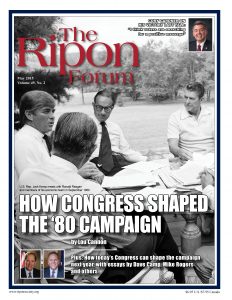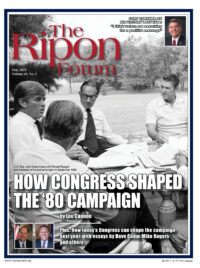
After Republicans won control of Congress last November, there were a number of stories written about what the new majority might achieve in the coming year. While there were differences of opinion about the policy proposals that might be pursued, there was a general consensus that the GOP didn’t have much time to act.
As Kristina Peterson wrote in the Wall Street Journal the day after the election, “Republicans in the House and Senate will have a limited window to try to pass legislation before their efforts are overshadowed by the 2016 presidential campaign.” Peterson’s story typified the analysis at the time, and was based on recent campaigns which saw the nominees of both parties set the agenda while Congress faded into the background of the debate.
With the first presidential debate set for August 6th, many Republicans are now wondering whether history will repeat itself again. Will the House and Senate become passive bystanders and watch the political focus shift to the campaign trail? Or will the GOP Majority defy history by shaping the agenda on Capitol Hill? Precedent exists for them to do just that, and in this latest edition of The Ripon Forum, we not only look at that precedent, but examine areas where Republicans have the opportunity to seize the initiative today.
Leading our coverage is award-winning journalist and author Lou Cannon. As Cannon writes in our cover essay, in 1980 then-candidate Ronald Reagan embraced a plan authored by U.S. Rep Jack Kemp and U.S. Sen. William Roth to cut tax rates across-the-board. The Kemp-Roth tax plan became the economic centerpiece of Reagan’s victorious campaign and helped define the first two years of his presidency. According to Cannon, it could also serve as an example for Congressional Republicans today.
Veteran strategist David Winston agrees. Pointing to data which reveals that voters want Congress to propose policies to improve the economy rather than oppose President Obama, Winston argues in another essay that Congressional Republicans can shape next year’s debate by putting forward their own agenda this year. “If the 2010 and 2014 elections taught us anything,” he writes, “it is that in this political climate, you win elections by winning issues.”
We look at several of these issues with essays by some of Washington’s leading thinkers and policy entrepreneurs, including former Ways & Means Chairman Dave Camp, who offers his expert analysis about tax reform and how Congress can impact the debate heading into next year, and former House Intelligence Committee Chairman Mike Rogers, who shares his thoughts on how the GOP Majority can do the same on national security. Joining Camp and Rogers with essays on the topic are former Deputy Health and Human Services Secretary Tevi Troy, who writes that Republicans need to develop a governing agenda that includes “targeted health care reform;” and, Robert Atkinson, who serves as President of the Information Technology & Innovation Foundation and argues that the GOP Majority should look for ways to “help enterprises and high-growth start-ups become more productive, innovative and competitive.”
Also featured in this latest edition of The Ripon Forum is former Senator Tom Coburn, who writes about the effort he is supporting to convene a Conference of States “to return the country to its original vision of a limited federal government.” Continuing our year-long commemoration of the Forum’s 50th anniversary, former Ripon Society President Lee Huebner writes about the founding of the Society and how one of the group’s organizing principles was “the advancement of Civil Rights.” And Jared Meyer of the Manhattan Institute looks at three first-term GOP governors presiding over blue states and explains why tax reform might be the key to their success. And in our latest Ripon Profile, freshman Senator Cory Gardner discusses the key to his victory last fall and what voters are looking for from Washington, DC.
As always, we hope you enjoy this edition of the Forum, and encourage you to contact us with any thoughts or comments you may have.
Lou Zickar
Editor of The Ripon Forum
louzickar@riponsociety.org




